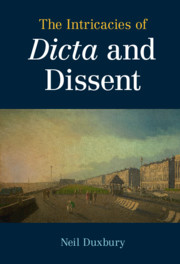Introduction
from Essay II - Dissent
Published online by Cambridge University Press: 30 July 2021
Summary
‘I have touched no question’, Justice Benjamin Curtis observed in Dred Scott v. Sandford, ‘which … it was not absolutely necessary for me to pass upon’ in order ‘to arrive at a judgment on the case at bar’. Curtis’s reasoning in Dred Scott might have been necessary to his own judgment – which was a dissenting opinion – but it was not necessary to the judgment of the United States Supreme Court. A dissenting opinion is, technically speaking, an obiter dictum. It is in the nature of an obiter dictum that it can be removed from the narrative of a case without the decision in the case being affected.
- Type
- Chapter
- Information
- The Intricacies of Dicta and Dissent , pp. 127 - 252Publisher: Cambridge University PressPrint publication year: 2021

